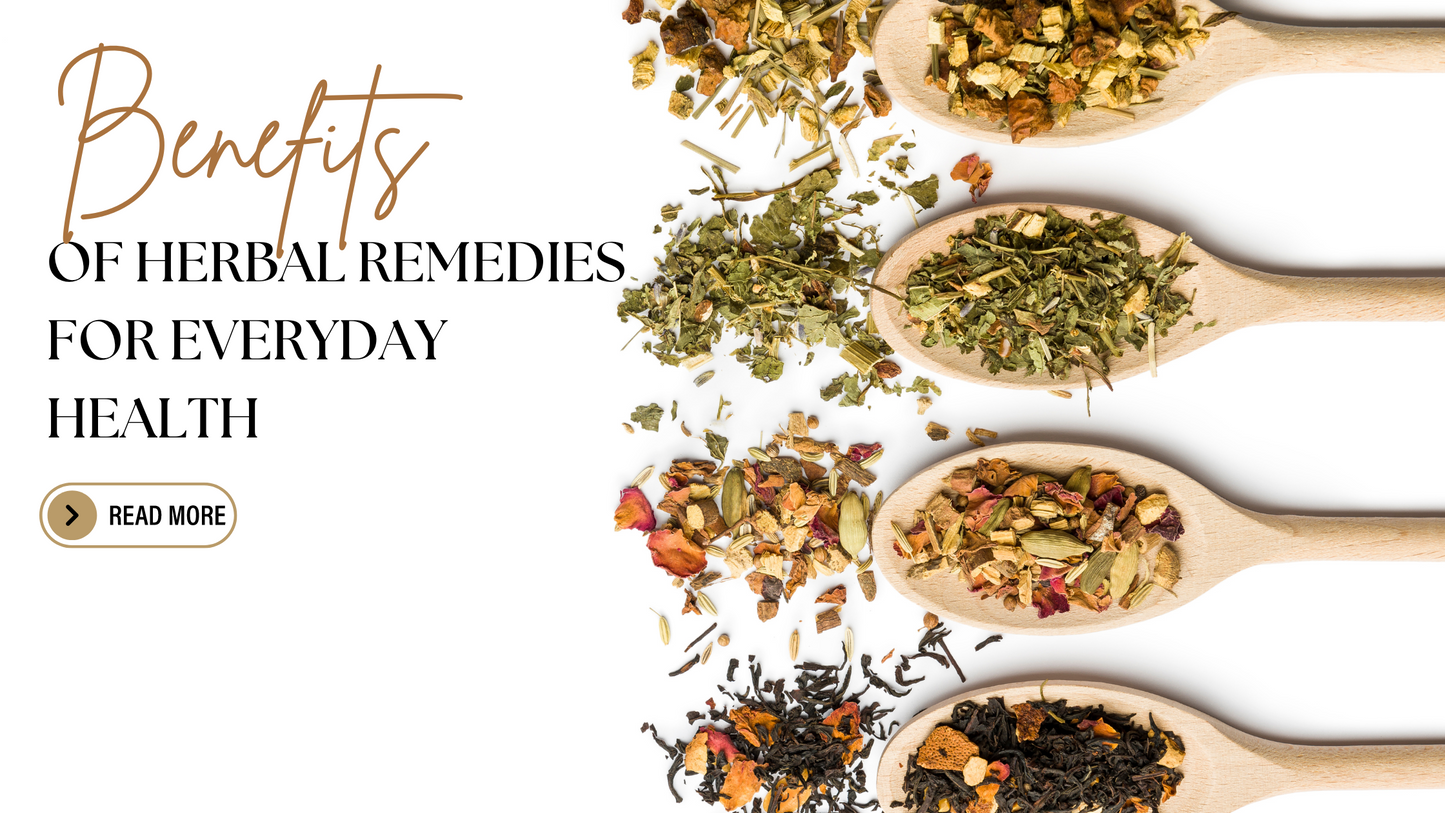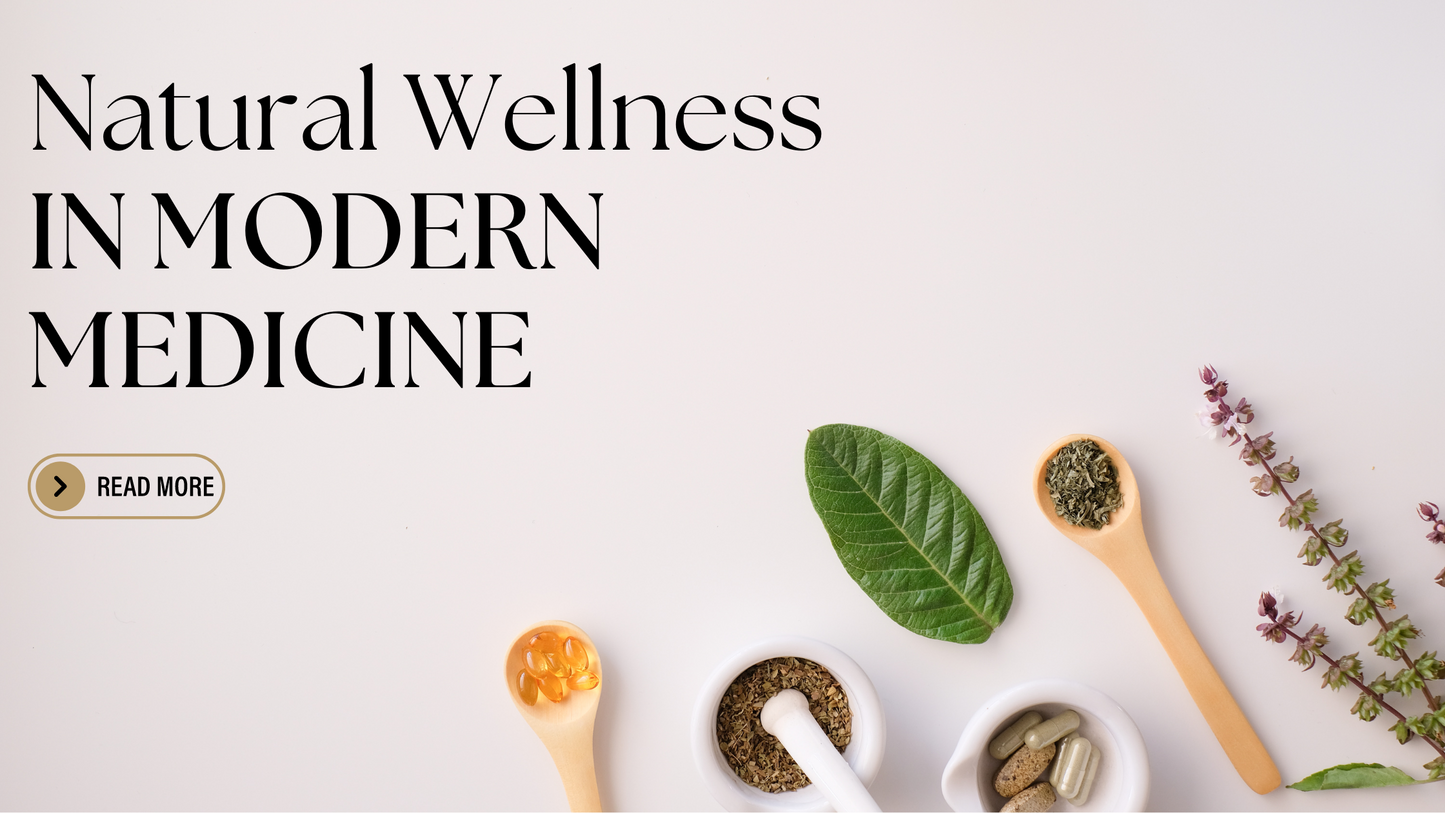
Herbal Remedies: Benefits, Uses, and How to Incorporate Them
In recent years, there's been a significant shift in the way people approach health and wellness. As more individuals seek alternatives to conventional medicine, the popularity of herbal remedies has soared. These natural treatments, derived from plant parts such as roots, leaves, seeds, and flowers, have been used for centuries across various cultures. Today, they are increasingly recognized for their potential to support everyday health in a holistic and gentle manner.
The growing interest in herbal remedies can be attributed to a variety of factors, including the desire to use more natural and less processed substances, concerns about the side effects of synthetic drugs, and an increasing body of scientific evidence supporting the efficacy of certain herbs. Whether it's for boosting immunity, improving digestion, or enhancing mental clarity, more and more people are turning to nature's pharmacy for solutions.
This blog will delve into the benefits of herbal remedies and provide practical advice on how to safely and effectively incorporate them into your daily routine.
What Are Herbal Remedies?
Herbal remedies are natural treatments made from plant materials. Unlike pharmaceutical drugs, which often isolate a single active ingredient, herbal remedies typically use the whole plant or plant part, which may contain a variety of compounds that work synergistically to promote health. These remedies are available in various forms, including teas, tinctures, capsules, powders, and topical applications.
Some of the most commonly used herbal remedies have roots in traditional practices like Ayurveda, Traditional Chinese Medicine (TCM), and Native American medicine. Over time, these practices have evolved and merged with modern science, leading to a renewed interest in herbal medicine as a complement or alternative to conventional treatments.
Growing Popularity in Modern Health
The resurgence of interest in herbal remedies can be seen as part of a broader trend towards holistic and preventive health care. With an increasing number of people seeking to take control of their health in a natural way, herbal remedies offer a versatile and accessible option. They can be used to address a wide range of health issues, from common colds to chronic conditions, and are often perceived as being gentler on the body compared to pharmaceutical drugs.
Moreover, the global shift towards natural and organic products has further fueled the demand for herbal remedies. Consumers are becoming more educated about the potential side effects of synthetic chemicals and are seeking out products that align with their values of sustainability and environmental responsibility. As a result, herbal remedies are not just a trend but are becoming a mainstay in the wellness routines of people around the world.
Common Herbal Remedies
Many herbs have gained popularity due to their well-documented health benefits and versatility. Here, we'll explore some of the most widely used herbal remedies and how they can support your health:
- Turmeric
- Benefits: Turmeric, with its active compound curcumin, is a powerful anti-inflammatory and antioxidant. It's commonly used to support joint health, manage inflammation, and boost the immune system. Turmeric also shows promise in protecting against heart disease, Alzheimer's, and cancer.
- Ginger
- Benefits: Ginger is renowned for its digestive benefits. It can help alleviate nausea, indigestion, and bloating. Additionally, ginger has anti-inflammatory properties and can help reduce muscle pain and soreness.
- Echinacea
- Benefits: Echinacea is a go-to herb for boosting the immune system, especially during cold and flu season. It may help reduce the severity and duration of colds and is often used as a preventive measure against respiratory infections.
- Lavender
- Benefits: Lavender is best known for its calming and relaxing properties. It is commonly used to reduce stress, anxiety, and insomnia. Lavender can also be used to alleviate headaches and migraines.
- Chamomile
- Benefits: Chamomile is another herb known for its calming effects. It's often used to treat insomnia, anxiety, and digestive issues such as indigestion and bloating
Incorporating Herbal Remedies into Your Daily Routine
Incorporating herbal remedies into your daily routine can be simple and enjoyable. Here are some practical tips to help you make the most of these natural solutions:
- Morning Ritual: Start your day with a cup of herbal tea, such as ginger tea or Detox Tea to kickstart your metabolism and energize your body. If you're not a tea drinker, consider adding a teaspoon of ashwagandha powder to your morning smoothie for stress support and mental clarity.
-
Cooking with Herbs: Many herbs, like turmeric, ginger, and garlic, can be easily incorporated into your meals. These herbs not only add flavor but also offer significant health benefits. For example, turmeric can be added to soups, stews, and even scrambled eggs, while fresh ginger is perfect for stir-fries, marinades, and baked goods.
-
Herbal Supplements: For those who may not have the time to prepare herbs in their natural form, herbal supplements are a convenient alternative. These can be taken in capsule or tincture form and provide a concentrated dose of the active ingredients found in the herbs.
-
Aromatherapy: Essential oils derived from herbs like lavender, peppermint, and eucalyptus can be used in aromatherapy to promote relaxation, alleviate headaches, and support respiratory health. You can use a diffuser, add a few drops to your bath, or apply diluted oils directly to the skin for targeted relief.
- Topical Applications: Some herbs, like tea tree oil, are highly effective when applied topically. These can be used to treat skin conditions, relieve muscle pain, and support wound healing.
- Bedtime Routine: End your day with a relaxing herbal tea, such as chamomile, lavender or Sweet Dreams herbal tea blend, to help you unwind and prepare for a restful night's sleep. For added relaxation, consider using lavender essential oil in a diffuser or adding a few drops to your pillowcase. You can also explore our Winter Support Herbal Bath Soak for a calming and rejuvenating bath experience.
Scientific Evidence Supporting Herbal Remedies
The use of herbal remedies is often supported by both traditional wisdom and modern science. While traditional uses are based on centuries of practice, recent scientific research has provided evidence for the effectiveness of many herbs in treating various health conditions.
- Turmeric: Numerous studies have demonstrated that curcumin, the active compound in turmeric, has powerful anti-inflammatory and antioxidant effects. Research suggests that it can be beneficial in managing conditions such as arthritis, inflammatory bowel disease, and even in the prevention of chronic diseases like heart disease and cancer.
The bioavailability of curcumin is enhanced when consumed with black pepper, which contains piperine, a compound that increases its absorption in the body.
- Ginger: Ginger has been extensively studied for its ability to reduce nausea and vomiting, particularly in cases of pregnancy, chemotherapy, and post-surgery. It's also effective in reducing muscle pain and soreness due to its anti-inflammatory properties. Studies have shown that regular consumption
- Echinacea: Research suggests that echinacea may reduce the risk of developing colds by up to 58% and shorten the duration of a cold by 1.4 days.
- Lavender: Clinical trials have found that lavender oil can be as effective as certain anti-anxiety medications, without the sedative effects.
Safety Tips for Using Herbal Remedies
While herbal remedies are generally safe, it's important to use them wisely:
- Consult a Professional: Before starting any new herbal remedy, it's advisable to consult with a healthcare professional, especially if you're pregnant, nursing, or taking other medications.
- Start Slowly: Introduce new herbs gradually to see how your body reacts.
- Quality Matters: Use high-quality, organic herbs and supplements from reputable sources to avoid contaminants.
- Allergies and Interactions: Be aware of potential allergies and interactions with other medications. Some herbs can interact with prescription drugs, so it's essential to check with a healthcare provider.
Herbal remedies offer a natural and effective way to support your health and well-being. From turmeric to lavender, these herbs can be easily incorporated into your daily routine to help manage a variety of health concerns. As more scientific evidence supports their benefits, it's clear that herbal remedies are more than just a passing trend—they're a valuable tool in maintaining everyday health.
By embracing the power of plants, you can take a natural, proactive approach to your health. Start today and experience the benefits of herbal remedies for yourself!
FAQs
1. What are herbal remedies, and how do they differ from pharmaceutical drugs?
Herbal remedies are natural treatments made from plant materials like roots, leaves, seeds, and Unlike pharmaceutical drugs, which typically isolate a single active ingredient, herbal remedies use whole plant parts that contain multiple compounds working synergistically to promote health. Herbal remedies are often seen as gentler on the body and are available in various forms, such as teas, capsules, tinctures, and topical applications.
2. What are some of the most commonly used herbs for boosting health?
Popular herbal remedies include:
Turmeric (for anti-inflammatory and immune support)
Ginger (for digestive health and reducing muscle pain)
Echinacea (for boosting the immune system, especially during cold and flu season)
Lavender (for reducing stress, anxiety, and insomnia)
Peppermint (for soothing digestion and relieving headaches)
3. How can I incorporate herbal remedies into my daily routine?
Herbal remedies can easily be incorporated into your day through:
Drinking herbal teas (e.g., ginger, turmeric, chamomile) in the morning or before bed Cooking with herbs like turmeric, ginger, and garlic
Taking herbal supplements in capsule or tincture form for a more concentrated dose Using essential oils for aromatherapy (e.g., lavender, peppermint)
Applying topical herbal treatments, such as creams or oils, for specific skin conditions or pain relief
4. Are herbal remedies supported by scientific evidence?
Yes, many herbal remedies are supported by both traditional wisdom and modern scientific research.
For example:
Turmeric has been studied for its anti-inflammatory and antioxidant effects, with evidence showing its benefits for joint health and chronic disease prevention.
Ginger is well-researched for its effectiveness in reducing nausea, especially in pregnancy and post-surgery. Echinacea has been shown to reduce the duration and severity of colds. Lavender has been found effective in reducing anxiety and stress.
5. Are there any safety considerations when using herbal remedies?
While generally safe, it’s important to use herbal remedies responsibly:
Consult a healthcare provider before starting any new herbal remedy, especially if you are pregnant, nursing, or on medication. Start slowly with new herbs to see how your body responds. Ensure that you use high-quality, organic herbs from reputable sources to avoid contaminants. Be mindful of potential interactions between herbs and prescription medications, as some herbs can interfere with drug efficacy.




